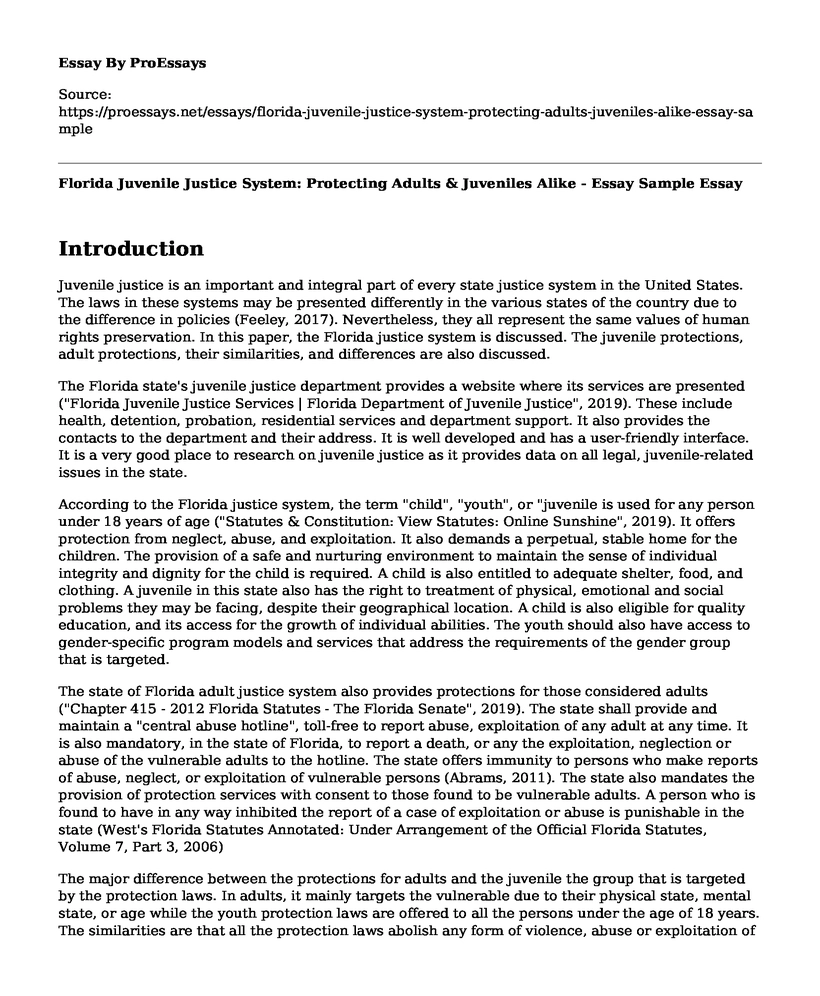Introduction
Juvenile justice is an important and integral part of every state justice system in the United States. The laws in these systems may be presented differently in the various states of the country due to the difference in policies (Feeley, 2017). Nevertheless, they all represent the same values of human rights preservation. In this paper, the Florida justice system is discussed. The juvenile protections, adult protections, their similarities, and differences are also discussed.
The Florida state's juvenile justice department provides a website where its services are presented ("Florida Juvenile Justice Services | Florida Department of Juvenile Justice", 2019). These include health, detention, probation, residential services and department support. It also provides the contacts to the department and their address. It is well developed and has a user-friendly interface. It is a very good place to research on juvenile justice as it provides data on all legal, juvenile-related issues in the state.
According to the Florida justice system, the term "child", "youth", or "juvenile is used for any person under 18 years of age ("Statutes & Constitution: View Statutes: Online Sunshine", 2019). It offers protection from neglect, abuse, and exploitation. It also demands a perpetual, stable home for the children. The provision of a safe and nurturing environment to maintain the sense of individual integrity and dignity for the child is required. A child is also entitled to adequate shelter, food, and clothing. A juvenile in this state also has the right to treatment of physical, emotional and social problems they may be facing, despite their geographical location. A child is also eligible for quality education, and its access for the growth of individual abilities. The youth should also have access to gender-specific program models and services that address the requirements of the gender group that is targeted.
The state of Florida adult justice system also provides protections for those considered adults ("Chapter 415 - 2012 Florida Statutes - The Florida Senate", 2019). The state shall provide and maintain a "central abuse hotline", toll-free to report abuse, exploitation of any adult at any time. It is also mandatory, in the state of Florida, to report a death, or any the exploitation, neglection or abuse of the vulnerable adults to the hotline. The state offers immunity to persons who make reports of abuse, neglect, or exploitation of vulnerable persons (Abrams, 2011). The state also mandates the provision of protection services with consent to those found to be vulnerable adults. A person who is found to have in any way inhibited the report of a case of exploitation or abuse is punishable in the state (West's Florida Statutes Annotated: Under Arrangement of the Official Florida Statutes, Volume 7, Part 3, 2006)
The major difference between the protections for adults and the juvenile the group that is targeted by the protection laws. In adults, it mainly targets the vulnerable due to their physical state, mental state, or age while the youth protection laws are offered to all the persons under the age of 18 years. The similarities are that all the protection laws abolish any form of violence, abuse or exploitation of any form to any individual.
The protections offered in the state show differences in some ways and similarities in other places. It is important to study the various protections offered by the justice systems in our states. Studying the variations with regard to age will help us distinguish the Adult protections offered to the juveniles from the adults.
References
Florida Juvenile Justice Services | Florida Department of Juvenile Justice. (2019). Retrieved from http://www.djj.state.fl.us/services
Statutes & Constitution: View Statutes: Online Sunshine. (2019). Retrieved from http://www.leg.state.fl.us/Statutes/index.cfm?App_mode=Display_Statute&URL=0900-0999/0985/0985.html
Chapter 415 - 2012 Florida Statutes - The Florida Senate. (2019). Retrieved from https://www.flsenate.gov/Laws/Statutes/2012/Chapter415
Feeley, M. (2017). Two models of the criminal justice system: An organizational perspective. In Crime, Law, and Society (pp. 119-137). Routledge. https://www.taylorfrancis.com/books/e/9781315095288/chapters/10.4324/9781315095288-7
Abrams, B. (2011). Florida family law. New York: LexisNexis/Matthew Bender. https://www.gsaadvantage.gov/ref_text/GS02F0174N/GS02F0174N_online.htm
Harrison Company, 2006. (2019). West's Florida Statutes Annotated: Under Arrangement of the Official Florida Statutes, Volume 7, Part 3. https://store.legal.thomsonreuters.com/law-products/Court-Rules/Westsreg-Florida-Statutes-Annotated-Annotated-Statute--Code-Series/p/100028484
Cite this page
Florida Juvenile Justice System: Protecting Adults & Juveniles Alike - Essay Sample. (2023, Jan 16). Retrieved from https://proessays.net/essays/florida-juvenile-justice-system-protecting-adults-juveniles-alike-essay-sample
If you are the original author of this essay and no longer wish to have it published on the ProEssays website, please click below to request its removal:
- Critical Thinking on Battered Woman Syndrome
- Research Paper on American Jury System
- Argumentative Essay on Police Use of Body-Worn Cameras in Criminal Justice
- Juvenile Mental Health Court Recidivism Essay
- Essay Sample on Cultural Validity
- Annotated Bibliography Paper Example on Multicultural Counselling: Best Practices for Change
- Essay on Walter Jordan: Negligence of Arizona Department of Correction Led to Skin Cancer Death







